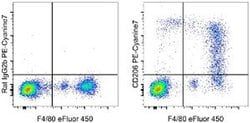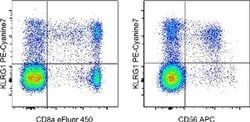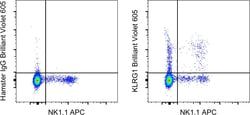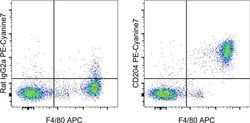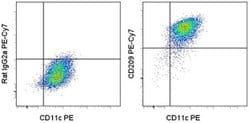CD206 (MMR) Monoclonal Antibody (MR6F3), PE-Cyanine7, eBioscience™, Invitrogen™
Manufacturer: Fischer Scientific
Select a Size
| Pack Size | SKU | Availability | Price |
|---|---|---|---|
| Each of 1 | 25-206-180-Each-of-1 | In Stock | ₹ 14,863.00 |
25-206-180 - Each of 1
In Stock
Quantity
1
Base Price: ₹ 14,863.00
GST (18%): ₹ 2,675.34
Total Price: ₹ 17,538.34
Antigen
CD206 (MMR)
Classification
Monoclonal
Concentration
0.2 mg/mL
Formulation
PBS with 0.09% sodium azide; pH 7.2
Gene Accession No.
Q61830
Gene Symbols
Mrc1
Purification Method
Affinity chromatography
Regulatory Status
RUO
Gene ID (Entrez)
17533
Content And Storage
4° C, store in dark, DO NOT FREEZE!
Form
Liquid
Applications
Flow Cytometry
Clone
MR6F3
Conjugate
PE-Cyanine7
Gene
Mrc1
Gene Alias
AW259686; bA541I19.1; CD206; CELE_Y39A3CR.4; CLEC13D; CLEC13DL; C-type lectin domain family 13 member D; C-type lectin domain family 13 member D-like; ddp-1; hMR; Human mannose receptor; macrophage mannose receptor 1; Macrophage mannose receptor 1-like protein 1; mannose receptor, C type 1; mannose receptor, C type 1-like 1; Mitochondrial import inner membrane translocase subunit Tim8; MMR; MR; MRC1; MRC1L1; tim-8; Y39A3CR.4
Host Species
Rat
Quantity
25 μg
Primary or Secondary
Primary
Target Species
Mouse
Product Type
Antibody
Isotype
IgG2b κ
Description
- Description: This MR6F3 antibody recognizes mouse CD206 also known as Macrophage Mannose Receptor (MMR) or Mannose Receptor C, Type 1 (MRC1)
- CD206 is a 175-kDa, type 1 integral membrane glycoprotein receptor that is present in macrophages, some dendritic cells, as well as liver and lymphoid endothelial cells
- CD206 belongs to the C-type lectin family
- Extracellular regions of CD206 include an N-terminal cysteine-rich (CR) domain that binds sulfated glycoproteins, a fibronectin II (FNII) domain that binds collagens, and eight carbohydrate recognition domains (CRDs) that bind sugars like mannose and fucose with high affinity
- CD206 mediates phagocytic and endocytic uptake of fungal, bacterial, protozoan and viral antigens, and plays an important role in immune defense and immune regulation
- A soluble form of CD206 is generated by cleavage of the full-length protein, and it can be detected in in vitro macrophage cell culture supernatants and in mouse serum
- CD206 is considered to be one of the markers of M2 macrophages
- Factors inducing its expression include: IL-4, IL-13, M-CSF, IL-6, IL-10, and glucocorticoids, while TNF-alpha, IFN-gamma, TGF-beta, and LPS have been reported to down-regulate expression of CD206
- It has been demonstrated that only a small fraction of CD206 is present at the cell surface, therefore, intracellular staining is recommended
- CD206 (MSR, Mannose receptor, MRC1) is a 175 kDa transmembrane protein belonging to the group of pattern recognition receptors
- CD206 is predominantly expressed in tissue macrophages, dendritic cells, a subpopulation of endothelial cells and sperm cells
- CD206 is thought to play a role in the innate and adaptive immune response
- CD206 is also expressed on microglia and mato cells of the brain but not astrocytes or neurons
- CD206 also mediate the recognition and uptake of a variety of macromolecules, including modified lipoproteins, advanced glycation end (AGEs) products and amyloid b-protein (Abeta)
- While the normal role of CD206 is associated with cell adhesion and host defense mechanisms, it also has been implicated in the development of atherosclerosis and Amyloid beta deposition in Alzheimer's disease (AD)
- CD206’s gene encodes the class A macrophage scavenger receptors, which include three different types (1, 2, 3) generated by alternative splicing
- The isoforms type 1 and type 2 are functional receptors and are able to mediate the endocytosis of modified low density lipoproteins (LDLs)
- The isoform type 3 does not internalize modified LDL (acetyl-LDL) despite having the domain shown to mediate this function in the types 1 and 2 isoforms
- CD206 has an altered intracellular processing and is trapped within the endoplasmic reticulum, making it unable to perform endocytosis
- The isoform type 3 can inhibit the function of isoforms type 1 and type 2 when co-expressed, indicating a dominant negative effect and suggesting a mechanism for regulation of scavenger receptor activity in macrophages
- Other diseases associated with CD206 dysfunction include leprosy and Gaucher’s Disease.
